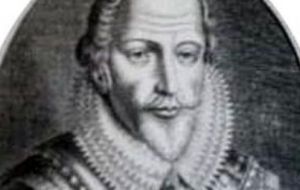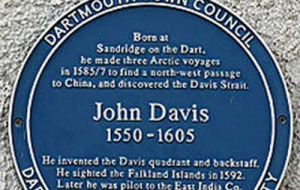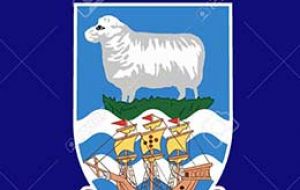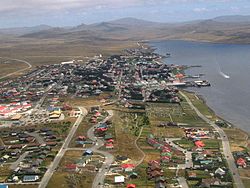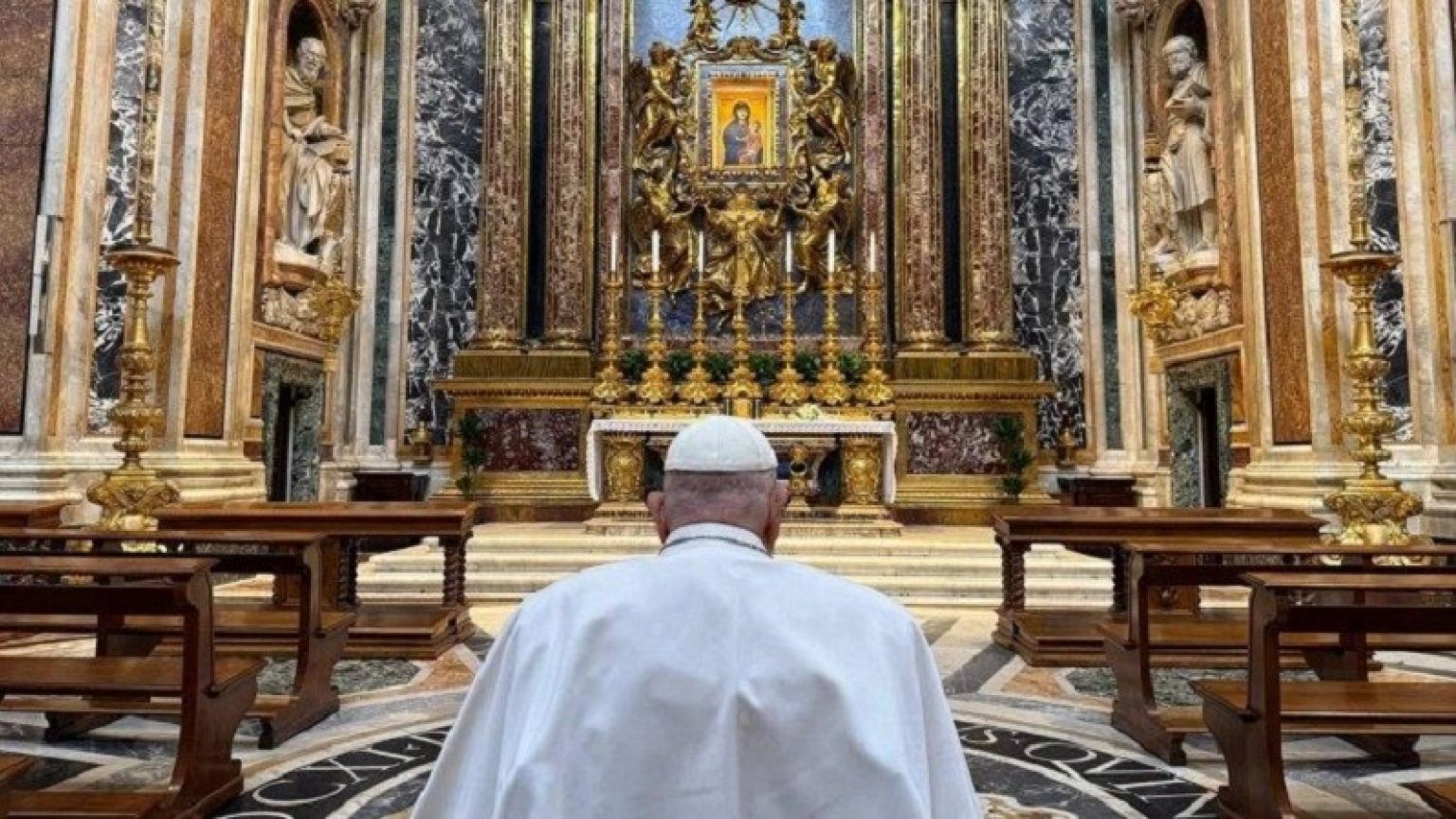Stanley (also known as Port Stanley) is the capital city of the Falkland Islands. It is located on the island of East Falkland, on a north-facing slope in one of the wettest parts of the islands. At the 2016 census, the city had a population of 2,460.[1] The entire population of the Falkland Islands was 3,398 on Census Day – 9 October 2016.
Stanley is represented by five of the eight elected members of the Legislative Assembly of the Falkland Islands: Stacy Bragger, Barry Elsby, Mark Pollard, Roger Spink, and Leona Vidal Roberts. An elected Town Council of Stanley existed from 1948 to 1973.
On 14 June 2022, Stanley received letters patent, formally awarding it city status.
Facilities and infrastructure
[edit]

Stanley post office, with British red post and telephone boxes.
Stanley is the main shopping centre on the islands and the hub of East Falkland's road network. Attractions include the Falkland Islands Museum, Government House—built in 1845 and home to the Governor of the Falkland Islands—and a golf course, as well as a whale-bone arch, a totem pole, several war memorials and the shipwrecks in its harbour. The Falkland Islands Company owns several shops. Stanley has four pubs, 11 hotels and guesthouses, three restaurants, a fish and chip shop and the main tourist office. There are three churches, including the Anglican Christ Church Cathedral, the southernmost Anglican cathedral in the world, and the Roman Catholic St. Mary's Church. A bomb disposal unit in the town is a legacy of the Falklands War.
The town hall serves as a post office, philatelic bureau, law court, and dance hall. The police station also contains the islands' only prison, with capacity for 13 inmates.
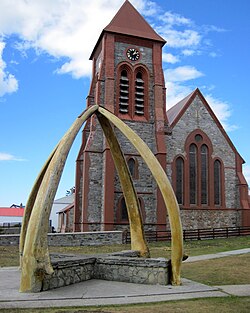
The
cathedral and whalebone arch
The community centre includes a swimming pool (the only public one in the islands), a sports centre, and school. A grass football pitch is located by the community centre. A separate building houses the college of further education and the library. A new sports centre is under construction to the south of the town centre, next to a newly-laid floodlit all-weather pitch.
Stanley Racecourse, located on the west side of Stanley, holds a two-day horse racing meeting every year on 26 and 27 December. The Christmas races have been held here for over 100 years.
Stanley Golf Course has an 18-hole course and a club house. It is also located to the west of Stanley.
King Edward VII Memorial Hospital is the islands' main hospital, with doctors' practice and surgery, radiology department, dental surgery and emergency facilities.
The Port Stanley Airport operates internal flights, and scheduled international passenger flights operate from the RAF Mount Pleasant military airbase.
Stanley is also home to the Falkland Islands Radio Station (FIRS), the Stanley office of the British Antarctic Survey, and the office of the weekly Penguin News newspaper.[2]
The original capital of the islands was at Port Louis to the north of the present site of Stanley, on Berkeley Sound. Captains Francis Crozier and James Clark Ross were recruited by Governor Richard Moody in his quest to find a new capital for The Falklands. Both Crozier and Ross (who are remembered in Crozier Place and Ross Road in Stanley) were among the Royal Navy's most distinguished seafarers. They spent five months in the islands with their ships Terror and Erebus, later lost looking for the Northwest Passage. Governor Moody (after whom Moody Brook is named), however, decided to move the capital to Port Jackson, which was renamed "Stanley Harbour", after a survey. Stanley Harbour was considered to have a deeper anchorage for visiting ships. Not all the inhabitants were happy with the change; a JW Whitington is recorded as saying, "Of all the miserable bog holes, I believe that Mr Moody has selected one of the worst for the site of his town."[3]

Settlement at Port Stanley, May 1849, by
Edward Fanshawe
Work on the settlement began in 1843 and it became the capital in July 1845. It was named after Lord Stanley, Secretary of State for War and the Colonies at the time. In 1849, 30 married Chelsea Pensioners were settled there to help with the defence of the islands and to develop the new settlement.
The settlement soon grew as a deep-water port, specialising at first in ship repairs; before the construction of the Panama Canal, Port Stanley was a major repair stop for ships travelling through the Straits of Magellan. The rough waters and intense storms found at the tip of the continent forced many ships to Stanley Harbour, and the ship repair industry helped to drive the island economy. Later it became a base for whaling and sealing in the South Atlantic and Antarctic.
Later still it was an important coaling station for the Royal Navy. This led to ships based here being involved in the Battle of the Falkland Islands in the First World War, and the Battle of the River Plate in the Second World War.
Landslides caused by excessive peat cutting destroyed part of the town in 1879 and again in 1886, which killed two people. At about midnight on 29 November 1878 a black moving mass, several feet high, was moving forwards at a rate of 4 miles per hour (6.4 km/h) or 5 miles per hour (8.0 km/h). The next morning the town was cut in two; the only way to travel between the two parts was by boat.[4]
During the Second World War, a hulk in Stanley Harbour was used for interning the British Fascist and Mosleyite Jeffrey Hamm.[5] A minor figure in the British Union of Fascists (BUF) at the time, Hamm moved to the Falkland Islands in 1939 to work as a teacher. He was arrested there (under Defence Regulation 18B) in 1940 for encouraging fascist views among his pupils and his BUF membership and later transferred to a prison camp in South Africa.

The
1982 Liberation Memorial, Stanley
Stanley Airport is used by internal flights and provides connections to British bases in Antarctica. Flights to Argentina ended after the 1982 conflict. A weekly flight to Punta Arenas in Chile commenced in 1993, which now operates out of RAF Mount Pleasant. Scheduled passenger flights between the Mount Pleasant airfield and the UK are also operated twice a week by a civilian airline contractor on behalf of the Royal Air Force.
Stanley was occupied by Argentine troops for about 10 weeks during the Falklands War in 1982. The Argentinians renamed the town Puerto Argentino, and although Spanish names for places in the Falklands were historically accepted as alternatives, this one is considered to be extremely offensive by many islanders.[6] Stanley suffered considerable damage during the war, from both the Argentine occupation and the British naval shelling of the town, which killed three civilians. After the British secured the high ground around the town the Argentines surrendered with no fighting in the town itself. The beaches and land around it were heavily mined and some areas remain marked minefields.
Since the Falklands War, Stanley has benefited from the growth of the fishing and tourism industries in the Islands. Stanley itself has developed greatly in that time, with the building of a large amount of residential housing, particularly to the east of the town centre. Stanley is now more than a third bigger than it was in 1982.
In 2022, as part of Queen Elizabeth II's Platinum Jubilee Civic Honours, Stanley was one of the successful bids for city status, coinciding with the 40th anniversary of the invasion and liberation of the port. On 14 June 2022, Stanley received letters patent from the monarch awarding city status.[7][8] The Governor of the Falkland Islands, Nigel Phillips, read out the document outside the town hall on the same day.[9]
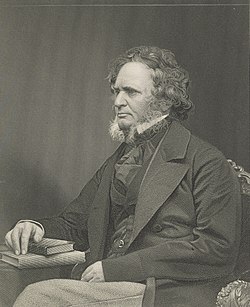
Stanley is named after
Edward Smith-Stanley, 14th Earl of Derby.
A number of variants of the city's name have appeared in both English and Spanish. Stanley Harbour was originally known as "Port Jackson", and this name would have applied to the area before the town was built. Although the town is officially known as "Stanley", it is frequently referred to as "Port Stanley", especially in British reports about the Falklands War. This is in line with various other settlements around the islands, e.g. Port Howard and Port Stephens. However, "Stanley" without the "Port" prefix was established long before the war, and on 2 August 1956, the Officer Administering the Government of the Falkland Islands reported to the Secretary of State for the Colonies in London as follows:
There is some difficulty over the correct name of the capital. Early despatches contain reference to both Port Stanley and Stanley. Port Stanley was accepted by the Naming Commission set up in 1943 to consider the names then being included on the War Office maps. Local opinion differs on the matter, but there is no doubt that Stanley is now common usage and has been for some considerable time. The capital is defined as Stanley in the Interpretation and General Law Ordinance. In the circumstances I would advise that the correct name for the capital is Stanley.[10]





